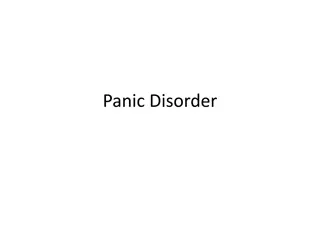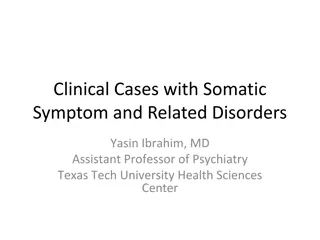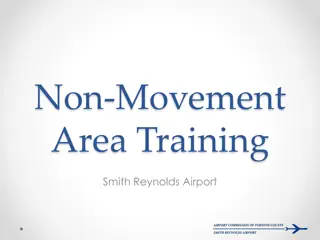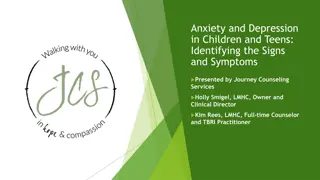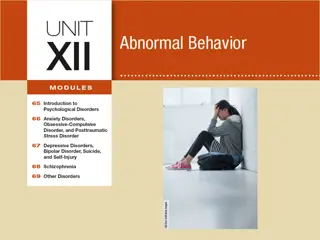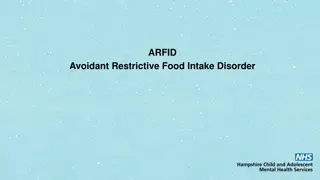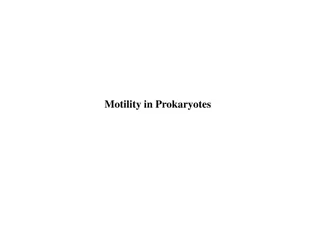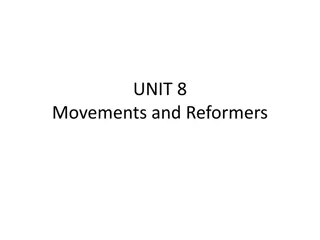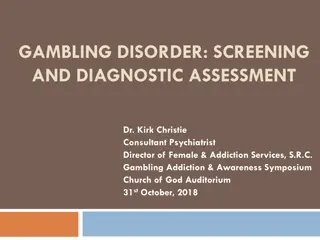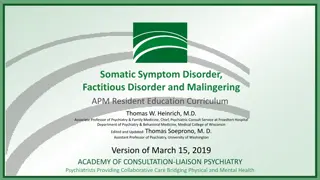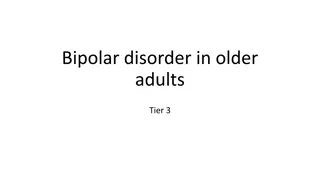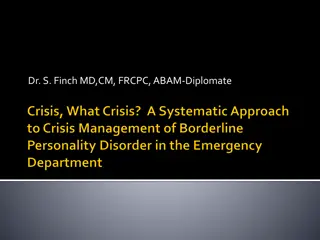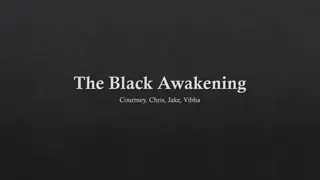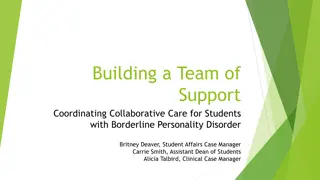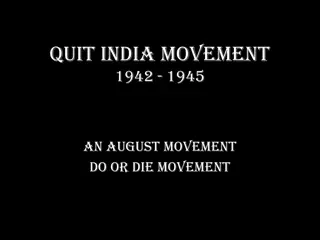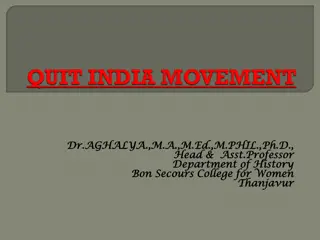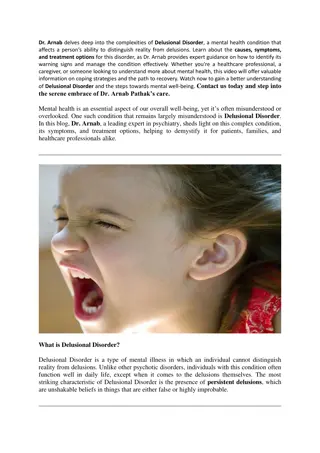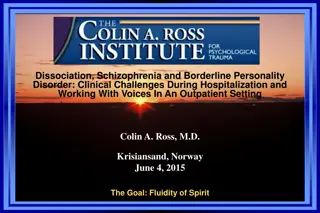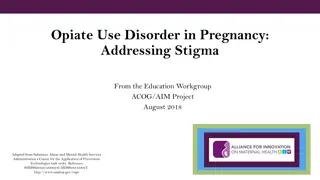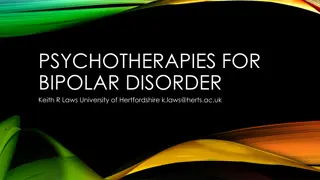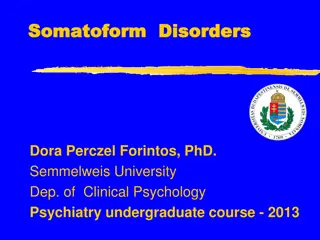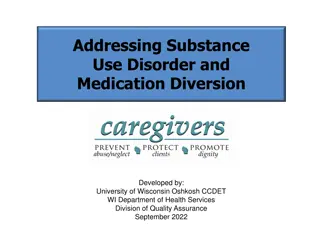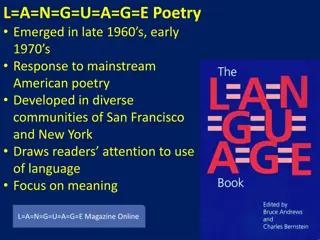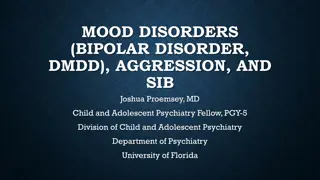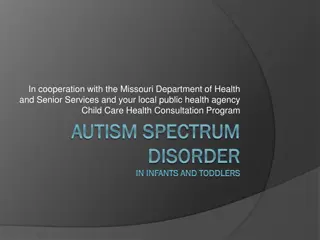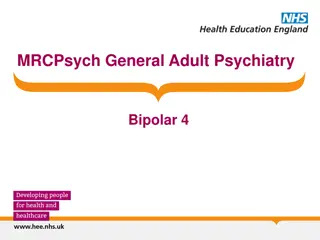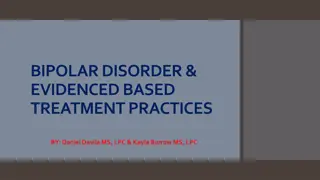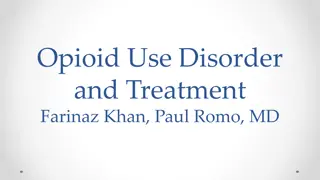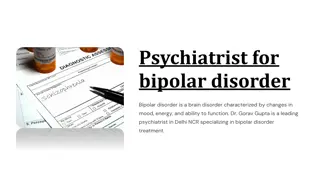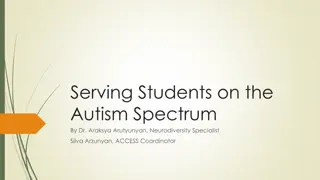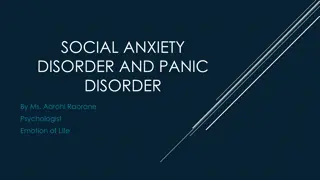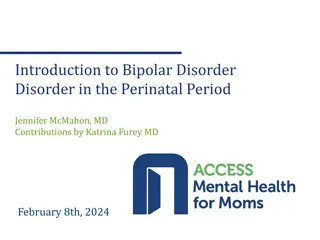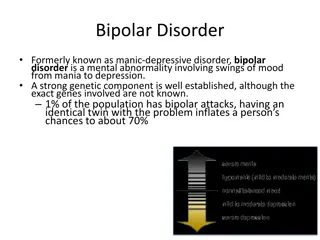Approach to Depression in Primary Care by Dr. Jon Davine
In this presentation, Dr. Jon Davine discusses the approach to depression in primary care, covering topics such as differential diagnosis, antidepressant medication selection, augmentation techniques, and treatment options like ECT and TMS. The sad state is explored through differential diagnoses, i
5 views • 56 slides
Understanding Panic Disorder: Symptoms, Diagnosis, and Management
Panic disorder is characterized by sudden, intense surges of fear or discomfort known as panic attacks. Individuals with this disorder may experience symptoms like chest pain, shortness of breath, dizziness, and a fear of having a heart attack. Differential diagnosis includes conditions like coronar
0 views • 8 slides
Understanding Anxiety Disorders and Related Conditions
Explore the distinguishing features of anxiety disorders such as generalized anxiety disorder, panic disorder, and phobias, along with insights into obsessive-compulsive disorder (OCD) and posttraumatic stress disorder (PTSD). Delve into the impact of conditioning, cognition, and biology on these co
2 views • 46 slides
Complex Case Study: Chronic Pain and Somatic Symptom Disorder
Michelle Adams, a 51-year-old hairdresser, presents with severe chronic back pain following a traumatic incident. Despite various treatments and medications, her pain persists, leading to distress and functional impairment. Her symptoms align with Somatic Symptom Disorder (SSD) with predominant pain
0 views • 50 slides
Establishing Safety Standards in Non-Movement Areas at Smith Reynolds Airport
This guide outlines the purpose, definitions, rules, and safety measures for operating vehicles in non-movement areas at Smith Reynolds Airport. It emphasizes standardized ground movement practices to ensure the safety of airport patrons, reduce the risk of injury, and maintain a high level of safet
1 views • 12 slides
Understanding Anxiety and Depression in Children and Teens
This presentation by Journey Counseling Services delves into identifying signs and symptoms of anxiety and depression in children and teens. Topics include the different components of anxiety, common signs and symptoms, and various types of anxieties such as phobias, separation anxiety, generalized
1 views • 11 slides
Understanding Depressive Disorders and Bipolar Disorder
Depression is prevalent among students and individuals in the US. Major depressive disorder and persistent depressive disorder are characterized by varying degrees of depressive symptoms lasting for different durations. The diagnostic criteria include signs of depression persisting for specific peri
0 views • 57 slides
Understanding ARFID: A Guide to Avoidant Restrictive Food Intake Disorder
Avoidant Restrictive Food Intake Disorder (ARFID) is a feeding and eating disorder characterized by significant weight loss, nutritional deficiency, and psychosocial impairment. Individuals may experience sensory sensitivity, lack of interest, or fear of aversive consequences. ARFID differs from pic
0 views • 18 slides
Exploring Motility in Prokaryotes: Flagellar, Spirochaetial, and Gliding Movements
Delve into the fascinating world of bacterial motility through three types of movements in prokaryotes: flagellar movement driven by rotating flagella, spirochaetial movement with flexible axial fibrils, and gliding movement observed in certain bacteria on solid surfaces. Additionally, discover how
1 views • 14 slides
Khilafat Movement in India: A Historical Perspective
The Khilafat Movement was a significant event in Indian political history, triggered by the British not fulfilling promises made to protect Turkey during World War I. The movement aimed to safeguard Turkey's holy places, restore its territories, and revive the Ottoman Empire. Despite efforts, includ
0 views • 30 slides
Understanding Gambling Disorder: Screening and Diagnostic Assessment
Dr. Kirk Christie, a Consultant Psychiatrist, delves into the world of gambling disorder, exploring definitions, neurobiology of addiction, screening instruments, DSM-V criteria, and harmful alcohol usage. Discover the differences between nondisordered, social, and problematic gambling behaviors, al
0 views • 27 slides
Understanding Somatic Symptom Disorder and Related Disorders
This educational material delves into Somatic Symptom Disorder, Factitious Disorder, and Malingering, emphasizing the importance of accurate diagnosis and management. It explores various aspects, including symptoms, classifications, and implications in bridging physical and mental health. The conten
0 views • 91 slides
Understanding Bipolar Disorder in Older Adults
Bipolar disorder in older adults can have a later onset, often after the age of 50, with episodes of mania and depression. Recognizing symptoms like excessive energy, inability to sleep, and cognitive impairment is crucial. Late-onset bipolar disorder differs from early-onset in familial illness rat
1 views • 12 slides
Understanding Borderline Personality Disorder (BPD) Crisis Presentations
Borderline Personality Disorder (BPD) is a common and challenging disorder, especially in clinical populations. With prevalence varying from 1-2% in the general population to up to 25% in agitated emergency patients, BPD often presents in crisis situations, leading to suicidal behavior and frequent
1 views • 41 slides
Overview of Quit India Movement and its Phases
The Quit India Movement was a significant event in India's struggle for independence, marked by various factors leading to its emergence, including the demise of the Civil Disobedience Movement and the rise of nationalist sentiments. The movement escalated in response to the outbreak of World War II
1 views • 9 slides
The Black Awakening: Challenges and Triumphs in African American Civil Rights Movement
In the early 20th century, influential leaders like Booker T. Washington and W.E.B. Du Bois led the fight for political and civil equality for African Americans. Despite facing obstacles such as segregation and disenfranchisement, groups like the Niagara Movement and NAACP emerged to promote racial
0 views • 7 slides
Effective Strategies for Children with Developmental Language Disorder, Sensory Processing Disorder, and Fine Motor Delays
Children with Developmental Language Disorder (DLD), Sensory Processing Disorder (SPD), and Fine Motor Delays often have accompanying sensory and fine motor deficits. Research indicates that addressing sensory processing deficits can significantly benefit children with DLD, ADHD, autism, and other d
0 views • 61 slides
Building a Team of Support for Students with Borderline Personality Disorder
Creating a collaborative care team is essential in supporting students with Borderline Personality Disorder (BPD). This involves understanding the clinical and nonclinical contexts surrounding BPD, such as the prevalence of the disorder, common symptoms, and challenges faced by individuals. The team
0 views • 13 slides
The Quit India Movement 1942-1945: An August Movement
The Quit India Movement, also known as the August Movement or Do or Die Movement, was a mass protest on nonviolent lines in India from 1942 to 1945. Initiated by the Indian National Congress, it called for an immediate end to British rule in India. Led by leaders like Mahatma Gandhi, the movement ai
0 views • 16 slides
The Quit India Movement: A Pivotal Moment in India's Independence Struggle
The Quit India Movement, also known as the India August Movement, was a key event in India's fight for independence led by Mahatma Gandhi in 1942. This movement urged the British to grant India independence through peaceful non-violent protests. It called for an immediate end to British rule, the fo
0 views • 15 slides
Delusional Disorder Explained by Dr. Arnab Causes Symptoms & Treatment
Dr. Arnab delves deep into the complexities of Delusional Disorder, a mental health condition that affects a person\u2019s ability to distinguish reality from delusions. Learn about the causes, symptoms, and treatment options for this disorder, as Dr
0 views • 4 slides
Understanding Schizophrenia, Dissociation, and Borderline Personality Disorder
Clinical challenges and treatment approaches for schizophrenia, dissociative identity disorder, and borderline personality disorder are discussed in this content. The genetic and environmental factors influencing these conditions are explored, along with insights from twin studies and treatment effi
0 views • 23 slides
Understanding Stigma in Opioid Use Disorder During Pregnancy
Stigma plays a detrimental role in Opioid Use Disorder (OUD) during pregnancy, leading to fear of judgment and hindering individuals from seeking help. This stigma can result in dropping out of treatment programs and societal exclusion. Substance use disorder, including OUD, is highly stigmatized, a
0 views • 24 slides
Psychotherapies for Bipolar Disorder - Evidence-Based Interventions
This content discusses psychotherapies for bipolar disorder, including managing bipolar depression and evidence-based manuals. It emphasizes the importance of psychological interventions tailored for bipolar disorder to effectively reduce relapse and manage symptoms. The content also highlights the
0 views • 9 slides
Understanding Somatoform Disorders: Symptoms, Diagnosis, and Treatment Options
Somatoform disorders are characterized by physical symptoms that mimic general medical conditions without an underlying medical or mental disorder. Patients often exhibit somatic symptoms without an organic basis, have poor insight, and do not find reassurance helpful. Common types include somatizat
0 views • 46 slides
Understanding Substance Use Disorder and Medication Diversion
Substance use disorder (SUD) can affect anyone regardless of age, occupation, or background. This training module covers the identification of SUD, best practices for prevention, and the impact of opioid use disorder. It emphasizes the importance of recognizing medication diversion and provides insi
0 views • 19 slides
Exploring L=A=N=G=U=A=G=E Poetry Movement of the Late 1960s and 1970s
The L=A=N=G=U=A=G=E poetry movement emerged in the late 1960s and early 1970s as a response to mainstream American poetry, focusing on diverse communities in San Francisco and New York. This avant-garde movement emphasized the use of language, drawing readers' attention to the nuances of meaning. No
0 views • 6 slides
Understanding Bipolar Disorder in Children and Adolescents
Bipolar disorder in young individuals is characterized by mood swings between manic and depressive states, with various subtypes such as Bipolar I, Bipolar II, and Cyclothymia. Clinical characteristics include hypomania and mania, which present with distinct symptoms such as elevated mood, increased
0 views • 35 slides
The Civil Rights Movement and Terence O'Neill's Demise (1964-1969)
The Civil Rights Movement in Northern Ireland, spearheaded by organizations like the Campaign for Social Justice (CSJ) and the Northern Ireland Civil Rights Association (NICRA), aimed to address widespread discrimination against Catholics. The movement advocated for electoral reform, an end to housi
0 views • 10 slides
Understanding Autism Spectrum Disorder in Infants and Toddlers
Autism Spectrum Disorder (ASD) is a developmental disability that presents challenges in social interaction, communication, and behavior. Individuals with ASD may exhibit a range of abilities from gifted to severely challenged. It is now considered a single diagnosis encompassing conditions like Aut
0 views • 36 slides
Understanding Bipolar Disorder: Course, Prognosis, and Treatment
Develop a comprehensive understanding of Bipolar disorder, including its course, prognosis, and risk factors for poor outcomes. Explore the prevalence, time course, and intensity of the disorder, as well as different types and changes in presentation over time. Gain insights from expert-led sessions
0 views • 29 slides
Understanding Bipolar Disorder and Evidence-Based Treatment Practices
This presentation by Daniel Davila, MS, LPC, and Kayla Burrow, MS, LPC delves into the complexities of bipolar disorder, potential crisis outcomes, and mental illness management through evidenced-based treatment practices. Topics covered include bipolar diagnosis, assessing disorder lethality, treat
0 views • 44 slides
Enhancing Emergency Medicine Training for Opioid Use Disorder
The research focuses on improving Emergency Medicine residency training regarding Opioid Use Disorder (OUD) treatment, particularly with Medications for Opioid Use Disorder (MOUD). It highlights the need for increased education and implementation of evidence-based practices such as naloxone and bupr
0 views • 13 slides
Understanding Opioid Use Disorder and Treatment Options
This presentation delves into the complexities of Opioid Use Disorder (OUD), discussing its impact on the neuroendocrine system, treatment options, including Medications for Opioid Use Disorder (MOUD), and special populations. The objective is to connect endogenous mechanisms to clinical observation
0 views • 52 slides
Psychiatrist for bipolar disorder
Bipolar Disorder is a brain disorder characterized by extreme mood changes; manic or hypomanic episodes and mixed episodes with depressive episodes. In the following blog post, the best psychiatrist for bipolar disorder treatment, Dr. Gorav Gupta, el
0 views • 7 slides
Understanding Genetic Variants Associated with Bipolar Disorder and Schizophrenia
This material covers the genetic variants linked to bipolar disorder (BD) and schizophrenia, focusing on the rs1064395 variant in the neurocan gene (NCAN). The study analyzed a cohort of 682 patients with BD and 1300 controls to identify associations with the disorder. The presentation emphasizes th
0 views • 22 slides
Understanding Autism Spectrum Disorder and Supporting Students
Autism Spectrum Disorder (ASD) is a neurodevelopmental disorder with persistent impairments in social communication and restricted, repetitive behaviors. This presentation covers diagnostic criteria, classroom behaviors, response strategies, academic accommodations, national statistics, causes of in
0 views • 26 slides
Understanding Social Anxiety Disorder and Panic Disorder
Social anxiety disorder and panic disorder are common mental health conditions characterized by intense feelings of fear and anxiety in social situations. Individuals with these disorders may experience physical symptoms such as trembling, racing heart, and upset stomach, along with emotional signs
0 views • 18 slides
Understanding Bipolar Disorder in the Perinatal Period
Jennifer McMahon, MD, presents insightful information on bipolar disorder in the perinatal period, covering epidemiology, diagnosis, screening, and management strategies. The presentation delves into the lifetime prevalence, subtypes, symptoms of mania and hypomania, and the key differences between
0 views • 32 slides
Understanding Mental Health Disorders: Bipolar Disorder, Anxiety Disorders, & More
Exploring various mental health disorders such as Bipolar Disorder, Anxiety Disorders, Generalized Anxiety Disorder, Panic Disorder, and Phobic Disorders. Learn about their symptoms, prevalence, and impacts on individuals' lives.
0 views • 41 slides

